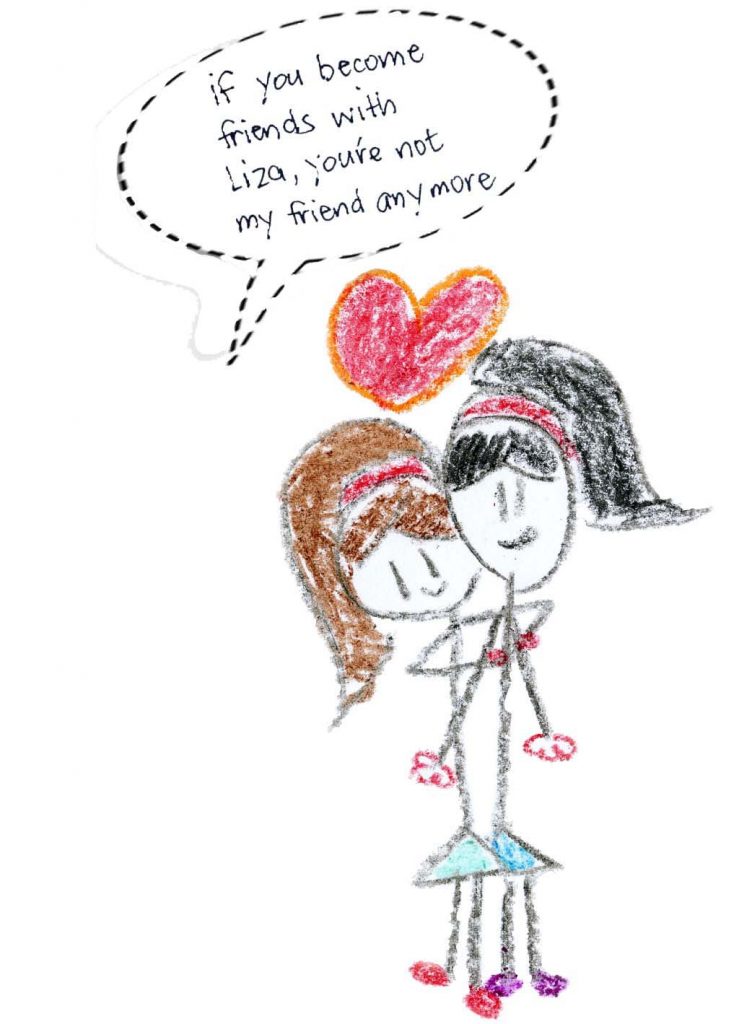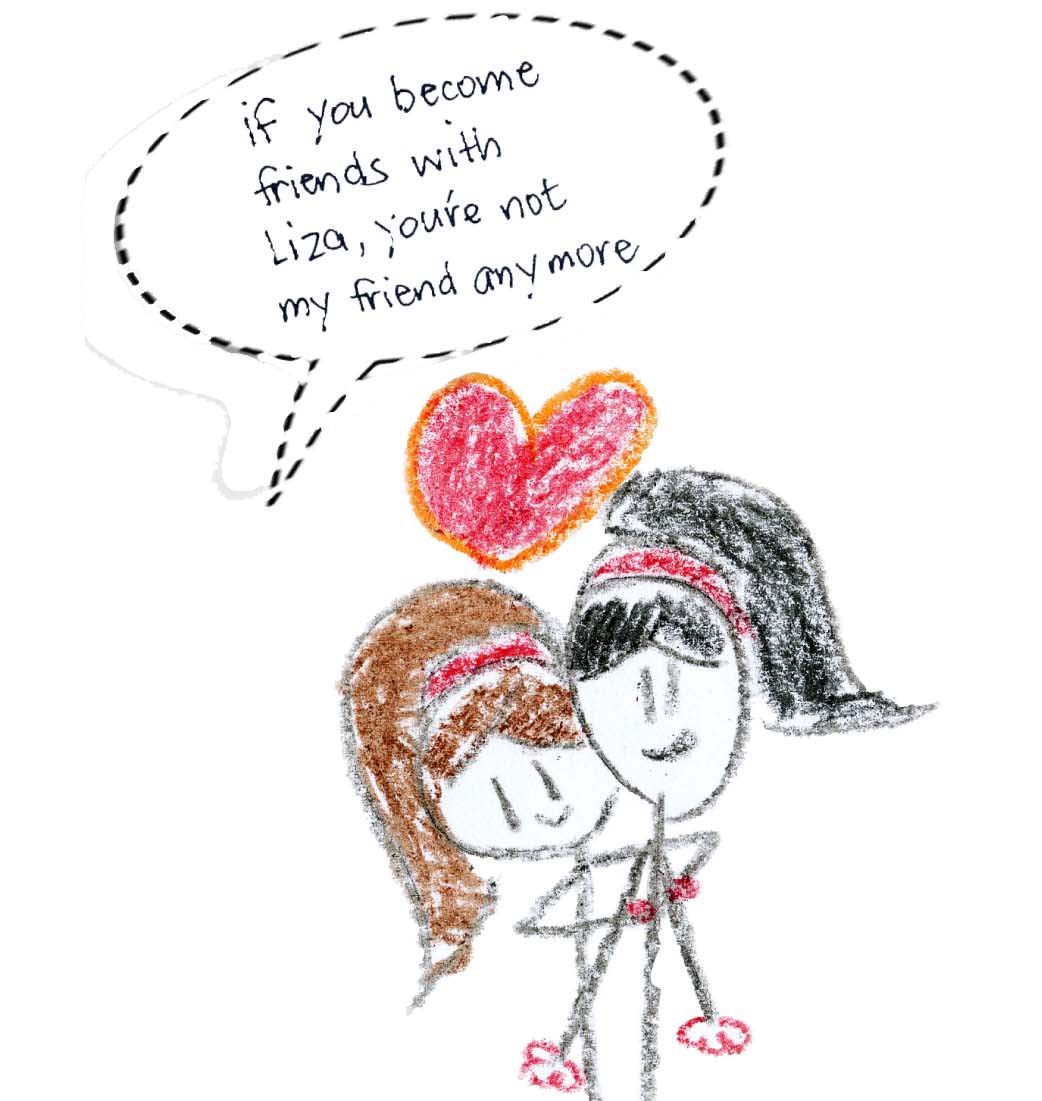My little shobe, who is daring and gungho about pretty much everything, had a major drama breakdown late last school year. I had to put her head on my chest so she would not see me smiling at her hacking sobs and giant tears.
The problem – typical 6-year-old issues of her BFF (best friend forever) telling her “if you play with C, you’re not my friend anymore.”
She then proceeded to tell me about how BFF also threatened other classmates, won’t allow shobe to share her snacks with other classmates… Basically, BFF wants my little Z all to herself.
BFF is an adorable and precocious child. She just happens to have a mean streak hidden from adults. Is BFF a bully?
Not (yet). I don’t think the child is a full-blown bully (yet), but without intervention she could be.
What causes bullying anyway? Psychologists and researchers have narrowed down the causes of general misbehavior, including bullying, into four – power, attention, revenge, self-confidence.
Make him/her stop
When you get down to the meat of the issue, the bullying behaviors are the results of those causes. Thus, when parents and teachers address only the outside symptoms without looking deeper into the issues, the bully’s behavior does not change.
The first step is acknowledgment. I doubt if any parent out there wants their children to be bullies. (Of course, there will always be parents, and subsequently their children, who believe that strong-arming others is the way to go. Honestly, they need anger management therapy – lots of it.)
We need to step back and look at our children objectively. Ask yourself, “How does my child treat other children?”

If you get a note from school about your child having problems interacting with other kids, listen to the teachers. It does not help anyone for parents to be defensive.
Some trouble-making kids are well-behaved at home; a mini Jekyll and Hyde, if you will. Do not think that the note from school is a judgment about your parenting capabilities. Parenting is difficult, and there is no shame in asking for help.
Do realize that teachers are the ones who see how your child behaves with others. They also want the best for your child so both the home and school need to work together for the child’s benefit.
The best method in handling the situation is to help the child realize that bullying is wrong. Think back to your own childhood and teenage years. Do you remember all those times when teachers and parents give you the grand sermon, and inside your head, you’re thinking of all the dramatic retorts you can’t really say out loud. Chances are, that may be what is going on in children’s heads as well.
Rather than a sermon, ask your child questions; talk to her until she realizes disrespect is unacceptable any time anywhere.
When Achi got into trouble for fighting with classmates, we had quite a loooooong conversation that went round and round. Achi did not feel that it was wrong for her to scream and kick her classmate: it was the classmate who started the fight by not letting her join the game. The issue was power; Achi was powerless to make her classmates allow her to play with them.
My questions revolved around 1) what did classmate feel when he got screamed at and kicked at, 2) what did Achi feel when she couldn’t join the game, 3) who among them was wrong.
At the end of our talk, the realization is that both of them were wrong, and that screaming and kicking were not solutions. In the end, Achi realized that screaming and kicking did not get her into the game and even made classmates more wary of her.
Our next step was to figure out alternative actions that Achi could take the next time she wants to join a game.
Head off bullying before it happens
Let’s be honest about it. Our personal behavior as parents is the role model our children copy. Sometimes, some parents talk tough, and kids translate that into acting tough in school.
“Talking tough” can come in many forms. It could be as simple as screaming at “stupid pedestrians! Ayan lang ang overpass! Tanga!” or blowing your top at the helpers who did not get that stain off your favorite shirt.
Children may see this as the way to hold power over others. As a parent, your actions do look strong and powerful. Think deeply. Is this really the message we want to give to our children?
In other cases, kids bully because they simply don’t know that it’s unacceptable to pick on kids who are different from them. I believe these are also cues they pick up from parents. When we are intolerant of others, that is the message that our children get.
On the flipside, bullying could also be attention-seeking behavior. A friend of mine once shared a dilemma when her daughter said, “I love yaya more, mommy.” She had to take a long hard look at herself – that week, she spent around eight waking hours with her daughter, an hour or so in the morning before she headed off to work and none at night. Were her deadlines more important than spending time with her daughter?
All parents grapple with this. How do we juggle work with our time with the kids? When we don’t spend enough time with them, they could turn their efforts to getting attention. Unfortunately, sometimes they resort to any kind of attention, even negative ones like teachers getting angry at them for bullying others.
Also observe your child’s level of self-confidence. Sometimes, when they don’t feel confident or comfortable in their own skin, they will attempt to divert attention away from their insecurities by being mean to others. This way, adults notice the mean behavior but disregard the overwhelming fear of failure the child feels.
Once we understand the causes of bullying behavior, then we can begin to help our children address these causes and not just deal with the symptoms we see. — First published in Tulay Fortnightly, Chinese-Filipino Digest 29, no. 4 (July 19-August 8, 2016): 11.
